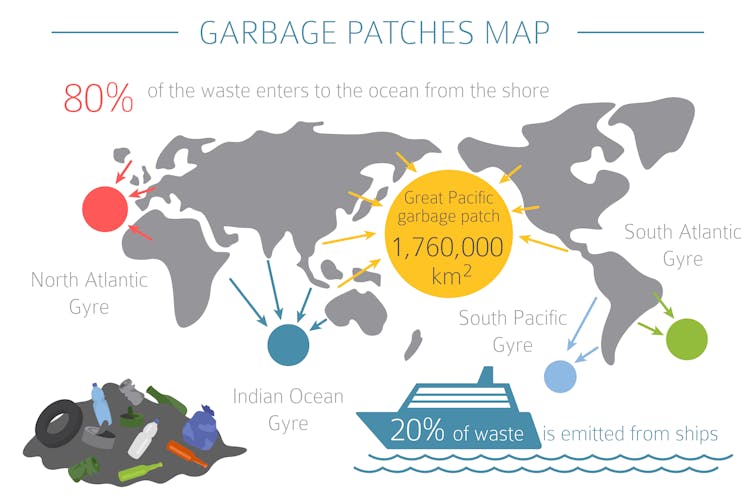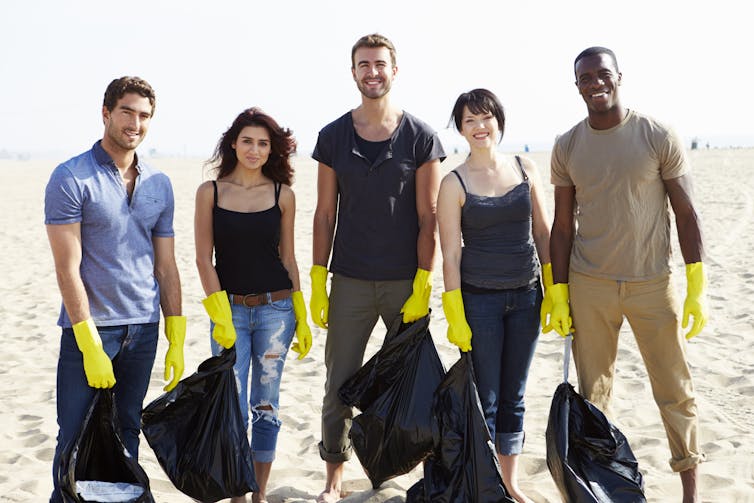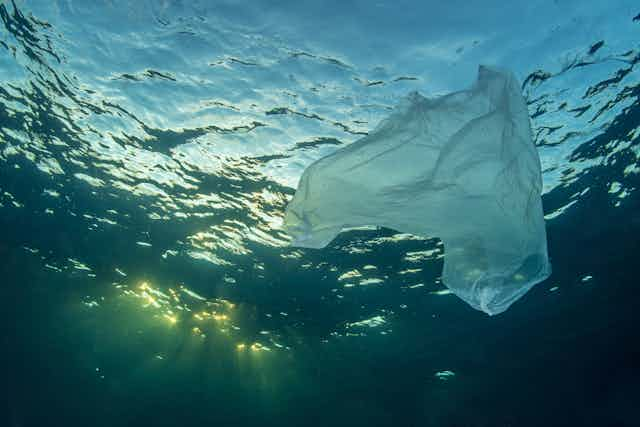Our oceans are threatened by three major challenges: climate change, overfishing and pollution. Plastic pollution is of growing concern, and has gained international attention from governments, media and large sections of the public, partly fuelled by last year’s BBC documentary Blue Planet II and its images of sperm whales and seabirds entangled or ingesting plastic debris.
Despite the attention plastic pollution has received, some scientists think this is the least important of the major marine threats, and that climate change and fisheries need more urgent attention.
This is not to say that plastic is not a major issue – it is, especially in some parts of the developing world, and in large open ocean gyre systems where ocean currents meet and all that they carry accumulates. Research has also found that microplastics (small fragments which form as larger plastic pieces are broken down in the sea) are found in seafood, and plastic may even accumulate as it passes up the foodchain.
The Ocean Cleanup
One reason why plastic pollution seems to get more attention than other threats to the ocean is that the issue may have a technological “fix”. The Ocean Cleanup is the flagship tech solution to marine plastic and proposes using several 600-metre long barriers to float in the ocean current and catch plastic drifting in the surface waters of the gyres.
Invented by a then 19-year-old student, the idea has come in for criticism in recent years with concerns ranging from the project’s ability to reach microplastics to it causing harm to wildlife.
Nevertheless, the Ocean Cleanup has captured imaginations by trying to reverse the problem of ocean plastic on a large scale.
We’re familiar with the idea that we can all do something to prevent plastic ending up in the sea, such as refusing plastic straws and carrying a refillable water bottle. However, while we need to use less, we also need to produce less, and throw away less of it. This means not only individual behaviour change, but changes in industrial processes, and government policies worldwide.
The visual impact of plastic pollution and high levels of public interest might be fundamental to some solutions. In many countries, local beach cleans are a regular occurrence, and are rapidly gaining in popularity. It has also been suggested that despite plastic hotspots in ocean gyres, eventually, many large plastic items will wash up on beaches, and that a significant proportion of plastic waste ending up in the sea comes from coastal or riverside communities.

Think global, act local
This provides hope for community networks to be formed that can combat plastic pollution at a local level. These networks need to expand beyond beach or river clean-ups to involve and engage multiple groups and individuals in society.
These stakeholders, who have a shared interest in healthy oceans, should include local retailers who can provide deposit return schemes on bottles and other recyclable materials and even reduce or eliminate the sale of products such as plastic straws, disposable coffee cups, plastic bags and takeaway containers.
Local councils could set up rubbish and recycling facilities for beach goers and enforce penalties for littering and fly tipping near beaches and rivers.
Communities in charge of managing their local environment have been shown to be effective in coastal areas, but issues always arise with the scaling-up of these approaches to national or international levels.
There is clearly a need for policies which support local initiatives, rather than combat them. For example, government policies should immediately call for bans on non-essential plastic packaging rather than “working to a target of eliminating avoidable plastic waste by the end of 2042” as the UK’s 25 year environmental plan currently indicates.

Remaining non-essential packaging should urgently be made recyclable, and recycling incentive schemes, such as payment for recycling, need to be introduced quickly, beyond the approaches used by local retailers.
Technological solutions can and should form part of our approach to environmental problems, whether plastic pollution or climate change. However, they can only be part of a solution.
Schemes which change attitudes and empower communities at a local level can be effective worldwide, but they need support from national and international policies to bring about real change. At present, pollution and natural resources are dismissed as necessary casualties in the pursuit of economic growth.
Support for seaside communities in policy is missing, and until it is in place, no high tech miracle will step in to save us.

